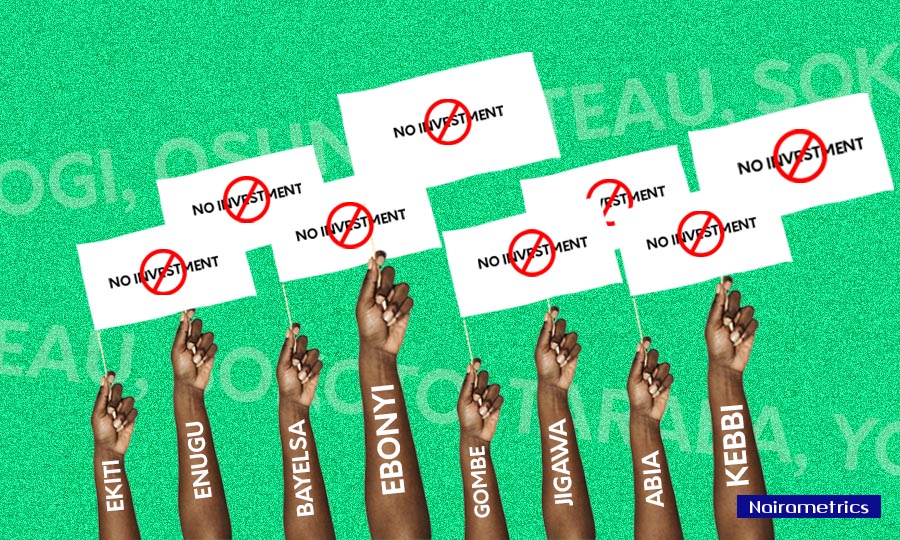Ekiti, Kogi, Sokoto, Bayelsa, Ebonyi, Gombe, Jigawa, Abia and five other state governments failed to attract investments in 2019, a report by the National Bureau of Statistics disclosed.
Others listed in the report are Kebbi, Plateau, Taraba, Yobe and Zamfara.
The NBS’s capital importation report contains the total amount of fresh investments attracted to the Nigerian economy during the period of time.
[READ MORE: States’ IGR hits N691 billion as Osun, others recorded biggest growth]
What it means: It means none of the 13 states governors contributed to the $23.99 billion the other 23 states attracted in 2019, a development contrary to their electoral promises.
The states that got new investments included Lagos State, which attracted the highest amount of $17.67 billion during the year. The $17.67 billion investment inflow into Lagos State represents about 73.6% of the $23.99 billion.
Followed by the Federal Capital Territory which attracted a total investment inflow of $6.20 billion. Adamawa State attracted the sum of $25 million; the same with Benue and Cross River states while Imo, Kano, and Kaduna states recorded investment inflow of $3 million, $1. 81million, and $4.63 million, among others.
In the same vein, Akwa Ibom recorded inflow of $55,035, Anambra, $61,000; Bauchi, $99,980; Borno, $500,000; Delta, $40,000; Katsina, $576,796; Kwara, $200,000; Niger, $67,156; Ondo, $30,000; Ogun, $16.01 million and Oyo $3.74 million.
Nairametrics had reported that Ekiti, Enugu, Bayelsa, Ebonyi, Gombe, Jigawa, Abia and eight other state governments failed to attract investments in the first half of the year 2019.
Others listed in the report are Kebbi, Kogi, Osun, Plateau, Sokoto, Taraba, Yobe and Zamfara.
READ MORE: HOT MONEY: Foreign Investors ship-out N257 billion from Nigerian stock market
What it means: Most of the states that failed to attract investments in H1 2019 also failed to attract any till the end of the year. That means either necessary steps were not taken by the governments, foreign investors saw no attraction in the states or the environments were not conducive for investment.
But the Founder of Stanbic IBTC Bank Plc, Mr Atedo Peterside, saw another reason. According to him, the level of structural imbalance in the country was forcing investors to exit from the country.
In a paper delivered recently, Peterside described the draft Petroleum Industry Bill produced by the previous administration as “myopic,” as it was incapable of stimulating the needed investments in the sector.
He said, “Investors appear to have concluded that the Nigerian economy is rigged against all except the very well-connected and they are right.
“By definition, the well-connected investors are few and so our Investment/GDP ratio is likely to remain low until we make it possible for all other investors to come back and partake in the task of baking a bigger cake on the basis of a level playing field.”
He said currently, only those that were “well-connected” could expect to have security of their lives and property, prompt dispensation of Justice, sanctity of contracts and non-harassment from multiple rogue regulators.
















